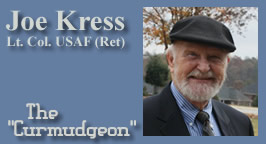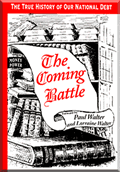THE
WIDER ROAD TO PERDITION
PART 9
By Lt. Col. Joe Kress
October 25, 2014
NewsWithViews.com
So far, previous parts in this series covered U.S. presidents who caused serious errors in judgment or had their own purposes to change and abort the Constitution that led eventually to wars and economic travail. The Congress was supposed to express the will of the people and represent the majority as well as the minority through collaboration, debate and amelioration. So many laws were passed that what was supposed to be the will of the people as represented by their states, were overwhelmed by the excesses of the Federal bureaucratic government at every stage and at every level. This Part 9 that ends the series, reviews the more recent presidents and the lack of congressional willpower to curb the chief executive's excesses, the affect of which lead our nation to the present crisis stage.
The United States is supposedly a democratic republic that is composed of three branches of government, the Judicial, the congressional (the legislative) and the office of the president (the executive).
It so happened ever since Washington refused the offer by his constituents to become king, the politicians almost immediately usurped the will of the electorate. The two party system was established, becoming so imbedded that third parties never emerged above the wishing stages except the Wig Party, later the anti-Federalist Party became the Republican Party and the "Federalist " became the Democrat Party. In 1828 -1854 there was the Jackson Democrats and the Wig Party led by Henry Clay who advocated that Congress be superior in power than the Executive Branch while it was just the opposite of the Jackson Democrat Party which fought to maintain the Executive as more important. The Wig Party emerged as the Republican Party and the Jackson Democrat Party finally emerged as the Democratic Party.
The leaders of the two major parties framed their respective agendas and thereby established the precedent that the public must chose to the lesser of two evils. The present day Tea Party, that emerged from their disgust with dictatorial government power and that of its and past and present president and their priorities and special interest can only be described as suffused mini dictatorships controlled through lobbies and bribery. Millions of participants finally met at the Washington mall to obtained a viable national voice. Sadly, although contributions were enormous in the beginning bombarded the internet and television, only two or three prominent members within the Republican side of Congress emerged in support of the Tea Party, and supporters claimed to be rither libertarian or independent, yet still remained Republican on the ballots because the Tea Party was never really established as viable. So in effect, no official leaders can be named as candidates representing only it. Only those who declared themselves as Teas Party candidate befitted the Tea Party image and could claim party leadership. No candidates under the Tea Party banner are officially listed to replace the imbedded bureaucrat politicians. The Tea Part is more illusionary than it is reality.
Nixon, Tough, Forceful and Seriously Flawed
Richard Nixon had the temperament of tough street fighter. Had it not been for his paranoiac fear that he had enemies dedicated to destroy him and his choice of flawed, but partially faithful advisers, he was a really a decisive and accomplished president honed by his prior campaign loss to President Kennedy and his subsequent campaign loss in the race against Pat Brown for the California governorship. At that point in his career, he considered himself finished. But his future brightened considerably because of the weakness of President Carter and reelection a distinct impossibility, so he picked up his cudgel and urged on by conservative Republicans who earlier though him to be dead meat, felt he had the best chance, with name recognition, brilliance and political acumen to win the election.
At the age of 56, on January 20, 1969, he took office of the presidency of the United States.
His challenge almost immediately after sitting behind the oval desk was the bloated federal bureaucrats, red tape, that fostered dependency on handouts and buried entrepreneurship. Throughout his political career he had opposed big government programs and fought to restore political authority to the local level. His goal was to further the goal of New Federalism. [notes taken from PBS Presidential Biographies]
Notable Domestic Accomplishments and Failures:
Launched initiatives to fight cancer and illegal drugs, imposed wage and price controls which consequently caused negative repercussions economically, He enforced desegregation of Southern schools and established the Environmental Protection Agency ( EPA) and Health Administration (OSHA), and signed into law the Clean Air Act and National Environmental Policy Act. These Acts and policies have now matured into fiefdoms of bureaucratic rules administered band inept czars as part of the Obama Administration.
He presided over the lunar landings beginning with Apollo 11, although he eventually replaced manned space exploration with shuttle missions which now have been reduced to Russian ferrying our Cosmonauts to a Russian space station and financed by our country because space is not in the Obama Administration vocabulary. He allowed the purchase of gold bullion in competitive markets and gold futures on the NY Stock exchange which reflected the enormous weakening of fiat money from $60 per ounce to the present $1,240 and ounce.
Foreign Policy Accomplishments and Failures
He opened the door to Red China which remained isolated from the West since the Communist revolution in 1949 and accomplished a more relaxed attitude. He also caused opening the genii bottle that created through trade the biggest danger economically and monetarily that our country has ever faced, The exportation of American lost Jobs and whole major industries and the taxes they pay benefit those countries who welcome them.
The Vietnam War was aggressively fought, but political inroads into our media and the public's weariness of war and the many casualties forced Nixon to hurriedly end the war and allow the North Vietnam communists to take over the country. This was a major blow to the U.S. prestige throughout the world,
He initiated detente with the Soviet Union in the wake of his diplomacy with China, leading to SALT 1 and the Anti-Ballistic Missile Treaty. He supported Israel during the Yom Kipper War, which led to an Israeli victory and a retaliation by Arab OPEC nations who refused to sell crude oil to the US during the1973 oil crisis. He covertly supported a military coup against Chilean Marxist president Salvador Allende.
Because of the Watergate Scandal and his Oval Office tape recordings, he escaped impeachment by resigning in disgrace. Yet he was brilliant and did make major good changes along with the very bad ones..
Gerald Ford
On October 10, 1973, Vice President Agnew resigned under allegations of Income Tax evasion and bribery. Two days, later, President Richard Nixon nominated Gerald Ford to take his place under the provisions of the Constitution's 25th Amendment, and in two months, Ford was sworn in as the country's 40th President.
Fords' administration was marked with tumult for the nation, including a serious ailing economy (and an almost bankrupt N.Y. City) an essential defeat in the Vietnam War, rocky foreign relations and an energy crisis. To top off the bad luck was an assignation attempt on his life by "Squeaky" Fromme and Sara Jane Moore, both part of the murderous Madsen Family.
Following Nixon's footsteps with China, Ford was the first president to visit Japan, but due to awkward trips and falls and verbal gaffs he was not impressive.
Ford was an internationalist like most of his predecessors and held membership in the elite Bilderberg Group, David Rockefellers Trilateral Commission and the Council on Foreign Relations all of which are dedicated to world government.
He was defeated by Jimmy Carter for re-election in 1976
Legacy of Humanitarianism
Carter was no less than one of the early members of the neo-Republican Rockefellers' founded and funded Trilateral Commission that was instrumental in elevating the unknown Governor of a lesser influential state of Georgia to be placed on the Democratic Party ballot to defeat Ford. Subsequently he was appointed the 41st President of the United States by hairline margin.
In a perfect world Jimmy Carter would be ideal as president. But in a world that really needs a leader in crisis Jimmy, a very smart fellow, was not ready to meet today's challenges or for that matter those that he faced when it came to Iran or the gasoline crisis, or stagflation, unemployment and higher taxes, a falling stock market and housing real estate interest rates hovering around 15%. to 20%. He named the problems as a national public malaise.
He assumed the presidency at a time of considerable optimism, initially enjoying sky-high Democrat approval ratings. Symbolizing a new kind of leadership which within months his main priority involved energy policy. With oil prices rising in the aftermath of the 1973 oil embargo, Carter believed it imperative to cure the United States of its dependence on foreign oil initially at 8% and huge emergency stores of oil and natural gas. The Iranian Revolution of 1979 again drove up oil prices and led to long lines at gas stations overshadowing Carters achievement.
Carter's foreign policy centered around a promise to make human rights a central concern in U.S. relations with other countries. He suspended military and economic aid to Chile, El Salvador and Nicaragua because of their human rights abuses. He reduced American military strength to near pre-WW II levels. The camp David accords was his most notable achievement between Israel, and Egypt, leading to a historic peace treaty in which Israel withdrew from the Sinai and both sides recognized each other's governments.
His relationship with Congress and the media, stifled his ability to enact legislation or effectively communicate his policies. As stated above regarding the public malaise, the disastrous speech was known as "Crisis of Confidence" which he appeared to blame the poor spirit of the people. His secret negotiations to return the Panama Canal to Panama led people to believe he was a weak leader who "gave away" the canal without securing necessary provisions for defending U.S. interests.
The way he handled the Iranian Hostage Crisis when radial Iranian students seized the U.S. embassy in Tehran, and took 66 hostages was the coup de grace for his reelection chances His failure to exercise tough methods instead of gentlemanly negotiations resulted in the hostages spending 444 days before finally being released because of Iran's awareness that Ronald Reagan would take a severe course of action, when taking office.
Ronald Reagan
As president, he came to the rescue of the economy and gained the world community's respect that was nearly lost by the fumbles and blunders of both liberal and so-called conservative predecessors. Regan was once the president of the Actors Guild as a rabid leftist, but he learned quickly that he was on the wrong track which was destroying the country and with his sour taste of Marx and the Socialist Democratic Party, he transformed himself into America's ideal conservative.
As president, Regan implemented sweeping new political economic initiatives. His supply-side economic policies, dubbed "Reagan Economics" advocated reducing tax rates to spur economic growth, controlling the money supply to reduce inflation, deregulation of the economy and reducing government spending In his first term. He was reelected in 1984 in a landside proclaiming it was morning in America.
His second term was primarily dedicated to foreign matters, such as ending the Cold War, the Libyan revolution and the death of Muammar Gaddafi. The Iran- Contra affair was not the success that it was meant to be. The hope was that the arms sale would secure the release of several hostages and allow the U.S. Intelligence agencies to fund Nicaraguan Contras. Under the Boland Amendment, further funding of the Contras by government had been prohibited by Congress. When it was later learned that Lt. Col. Oliver North, supported by his boss in the CIA, there was additional usurping the will of our Liberal Congress. He was the front man to secretly trade drugs in exchange for weapons and then supply the weapons to the Nicaraguan Contras. In testimony before a joint Congressional Committee investigating the matter, it soon dropped the proceedings because of too many high executives involved in the Administration and both political parties.
Reagan publically describing the Soviet Union as "an evil empire," he supported anti-communist movements worldwide and spent his first term forging the strategy of detente with Soviet Secretary Mikhail Gorbachev, culminating in the IMF Treaty that was meant to decrease both countries' nuclear arsenals. What wasn't considered, was the Soviets and successor government under Putan weren't destroying many of their intercontinental ballistic missiles. Over all, Regan evaluated by the American public was considered within the first rank of all of our best Presidents.
THOSE THAT FOLLOWED IN COMPARISON:
George H. W. Bush involved our country in the next series of undeclared wars. The Iraq none war to protect Kuwaiti oil left us with a strong impressions of exerting American involvement in areas of which we had no business. Besides the cost in American lives and treasure, the war patterns again were set to what eventually resulted in the execution of Saddam which opened the door for rampant chaos between Sunni and Shea that still exists today. Saddam was more in line with our interests than what later proved by the Saudis who proved to be no friend of the U.SA when Shea interests conflicted with Sunni interests and oil is used as a weapon against the West. Who needs friends? Bush #1 was first to declare the "New World Order" and predictably the most recent last three administrations accept loss of U.S. sovereignty in favor of the NWO.
|
|
Wars within the Middle East evidently are acceptable to mega corporations and international bankers who would benefit if the Middle East factions would self destruct. In the meantime, American citizens continue down the slippery slope where we suffer the pain of a socialist narcissist who applied for a loan as a foreigner with false documentation and mysteriously graduated with a Harvard law degree. Both he and his wife turned in their law licenses. Why? We now are at the nadir of our existence as a democratic republic with a mystery man at the helm of our government and $17 trillion dollars in debt. At every turn we suffer international embarrassment. May God save us! Government won't
Click here for part -----> 1, 2, 3, 4, 5, 6, 7, 8, 9,
� 2014 Joe Kress - All Rights
Reserved












 Share
This Article
Share
This Article





